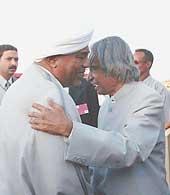Oil and grateful Sudan mix well for Kalam
By K. SUBRAHMANYA, The Telegraph (India)
 KHARTOUM, Oct. 22, 2003 — When President A.P.J Abdul Kalam touched down at the capital of Sudan yesterday, the mercury had climbed to 40 degrees Celsius on the tarmac of the international airport here.
KHARTOUM, Oct. 22, 2003 — When President A.P.J Abdul Kalam touched down at the capital of Sudan yesterday, the mercury had climbed to 40 degrees Celsius on the tarmac of the international airport here.
But the heat outside paled before the warmth inside – Sudanese President Omer Hassan Ahmed al Bashir, his deputy and senior ministerial colleagues were all lined up to extend a red carpet welcome to the Indian President.
It was unusually warm, perhaps the kind of which had not been felt during the previous two days when Kalam was in the United Arab Emirates. Kalam’s UAE counterpart and his host there, Sheikh Zayed bin Sultan Al Nahyan, was away in London for medical treatment during the Indian President’s visit.
Kalam is the first Indian head of state to come calling in over 25 years to Sudan, which had once hosted Osama bin Laden and is still trying to shake off suspicion that “terrorists” have found a nest in the country.
The real reason for the Sudanese leadership’s enthusiasm is that the visit helped break virtual global isolation.
The UN and the US sanctions – imposed in 1996 – are in place despite Khartoum’s cooperation in the post-9/11 fight against international terrorism.
The US still lists Sudan as a “state sponsor of terrorism”. In 1998, the US had fired missiles at a factory in Sudan it said was involved in making chemical weapons and was partly financed by Osama, who was in Sudan from 1991 to 1996. Sudan said the factory was only making medicines.
On the second day of the visit today, the Sudanese leadership extended the rare honour of inviting the President to address the country’s National Assembly.
“It is not unusual for visiting foreign dignitaries to address the National Assembly. But I cannot remember when this positive gesture was made to a visiting head of the state to address the Assembly the last time,” said a Sudanese foreign ministry official.
Diplomats accompanying the President were not forthcoming on the factors that guided the planning of the presidential visit at this juncture, but they suggested that the Americans won’t be too happy about the Indian diplomatic move.
However, of late, the US has appreciated Sudan’s cooperation in the hunt for al Qaida members, though Washington feels that more should be done.
Energy diplomacy is being seen as a key factor that helped India make up its mind. Delhi has perceived an opportunity to enter the promising Sudanese oil economy as an early bird. The Sudanese leadership appreciated India’s “bold” move last year to invest $750 million in the Greater Nile Petroleum Operating Company, previously owned by a Canadian group.
In his address to the 360-member National Assembly this afternoon, Kalam underscored Delhi’s emphasis on oil diplomacy.
“One of the key resources of Sudan is hydrocarbon. With a large part of the country still unexplored, hydrocarbon contribution to the national economy (of Sudan) is likely to increase significantly in the future.”
He underlined that India and Sudan can work together to build capabilities for oil exploration, refining, marketing and value added oil-based products.
At present, ONGC Videsh’s investment is confined to one major oil field in southern Sudan. But the potential is much larger as newer oil fields are being discovered fast.
